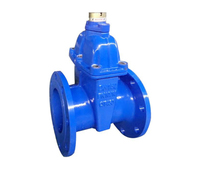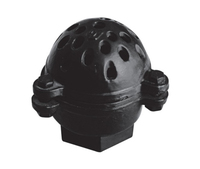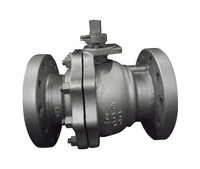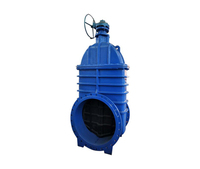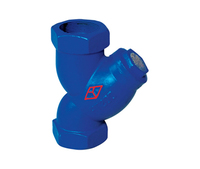NON-RISING STEM GATE VALVES
Product Quick Detail
- FOB Price
- USD $100.00 / Piece
- Minimum Order
- 1
- Place Of Origin
- china
- Packaging
- N/A
- Delivery
- 15 Days
Specifications
Non Rising Stem Gate Valve Drawing
Non rising stem gate valves is also called rotary stem gate valve (also called non rising stem wedge gate valve). The valve stem nut is set on the gate, and the handwheel rotation drives the valve
stem to rotate, so as to lift the gate. Generally, there are trapezoidal threads at the bottom end of the valve stem. Through the thread at the bottom end of the valve and the guide groove on the
valve disc, the rotary motion is changed into linear motion, that is, the operating torque is changed into the operating thrust. When the valve is opened, when the lifting height of the ram is
equal to 1:1 of the valve diameter, the fluid channel is completely unblocked, but in operation, this position cannot be monitored. In actual use, the apex of the valve stem is used as the mark,
that is, the position that can not be opened is used as its full open position. In order to consider the lock phenomenon of temperature change, usually in the open to the top position, and then
back 1 / 2 ~ 1 turn, as the full open valve position. Therefore, the full open position of the valve is determined by the position of the RAM (i.e. stroke).
Types of Non-rising Stem Gate Valves for Sale
As one of the most professional non rising stem gate valve manufacturers in China, Mstnland provides different kinds of non-rising stem gate valves for customers to choose from.
Anti-theft Type Soft-sealing Gate Valve
Cast Iron Internal Thread Non-rising Stem Gate Valve
Underground Installed Type Non-rising Stem Gate Valve
Cast Iron Clamp Type Non-rising Stem Soft-sealing Gate Valve
Cast Iron Non-rising Stem Soft-sealing Gate Valve
Worm Gear Non-rising Stem Wedge Gate Valve
Rising Stem Gate Valve vs Non Rising Stem Gate Valve
1. The stem of the rising stem gate valve is exposed and can be seen, while the stem of the non rising stem gate valve is not seen in the valve body;
2. The rising stem gate valve drives the gate up and down through the thread transmission between the stem and the steering wheel; the non rising stem gate valve drives the gate up and down through
the rotation of the stem at a fixed point. When switching, the steering wheel and the stem are connected and relatively fixed.
3. The transmission thread of the non rising stem gate valve is located inside the valve body. During the opening and closing process of the valve, the valve stem only rotates in place, so the
opening and closing state of the valve can not be judged by naked eyes. However, the transmission thread on the rising stem gate valve stem is exposed outside the valve body, which can directly
judge the opening and closing position of the gate;
4. The height of non rising stem gate valve is small, and the installation space is relatively small; the height of rising stem gate valve is large when it is fully opened, which requires large
installation space;
5. The stem of the rising stem gate valve is outside the valve body, which is conducive to maintenance and lubrication; the stem thread of the non rising stem gate valve is inside the valve body,
which is difficult to maintain and lubricate, and the stem is easy to be directly eroded by the medium, so the valve is easy to be damaged. In the scope of use, rising stem gate valve is more
widely used.
The Features of Non Rising Stem Gate Valves
The advantages of non rising stem gate valves: the height of the gate valve always remains unchanged, so the installation space is small. It is suitable for gate valves with large diameter or
limited installation space. This kind of structure should be equipped with opening and closing indicator to indicate the opening and closing degree.
The disadvantage of non rising stem gate valves: the stem thread is not only unable to be lubricated, but also directly subject to medium erosion, easy to damage.
As one of gate valves suppliers, we will do our best to meet all the needs of customers.
- Country: Afghanistan
- Business Type:
- Market:
- Founded Year:
- Address:Room A086, No.2 Bonded Port Area, Xinyingwan District, Yangpu Economic Development Zone, Hainan Province
- Contact:Michael Zhang

